| Article ID | Journal | Published Year | Pages | File Type |
|---|---|---|---|---|
| 6411863 | Journal of Hydrology | 2015 | 14 Pages |
â¢A comprehensive study on global aridity change is presented.â¢A new clustering procedure is performed to detect trends in aridity time series.â¢Three distinct groups of aridity index series around the world are identified.â¢The results indicate a change in aridity occurred around the 1980s.
SummaryThe growing demand for water and the anticipated impacts of climate change necessitate a more reliable assessment of water availability for proper planning and management. Adequate understanding of the past changes in water resources availability can offer crucial information about potential changes in the future. Aridity is a reliable representation of potential water availability, especially at large scales. The present study investigates the changes in global aridity since 1960. The study considers the UNESCO aridity index, with aridity being represented as a function of its two key drivers: precipitation (P) and potential evapotranspiration (PET). First, published literature on changes in trends of P, PET, and aridity across the world is surveyed. This is followed by the analysis of trends in the aridity observations over the period 1960-2009. The nonparametric Mann-Kendall test is performed for trend analysis and outcomes investigated for the presence of clusters of trend across different grid cells the analysis is conducted over. The results suggest that arid zones are becoming slightly more humid and vice versa. They also indicate that the trend in aridity changed, or even reversed, around 1980 in most parts of the world. We speculate that the reason for this was the dramatic change (rise) in global temperature around 1980 as per both published literature and the present analysis, which, in turn, caused similar trends for global PET. We also call for additional research to verify, and possibly confirm, the present results.
